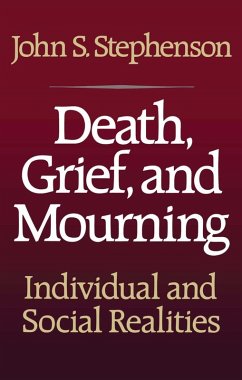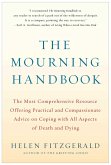How do Americans cope with death? Do our feelings about dying influence the way we live? How are our ideas of death different from those of our ancestors?
These questions and others are addressed in this innovative new book -- a comprehensive, interdisciplinary approach to the processes, practices, and experiences concerning death and dying in the United States. Drawing on sociology and psychology as well as history and literature, John S. Stephenson surveys the range of individual and social responses to death -- from our very conception of its meaning to the complex ethical dilemmas surrounding suicide and euthanasia.
Stephenson synthesizes a theoretical perspective of death from the contributions of such important thinkers as Freud, Jung, Ernest Becker, and Robert Jay Lifton. He reviews the evolution of American attitudes and behaviors toward death -- from the Puritan era to the present, and charts the significance of such organizations for the dying as hospitals, hospices, and nursing homes. Bereavement as both personal reaction (grief) and social convention (mourning) is also discussed, as is the denial of death as a coping mechanism for individuals and institutions alike.
In his final chapters, Stephenson analyzes the ceremonies of death (including gravestones as social indicators) and provides a psychosocial overview of suicide as a final, desperate attempt to assert control. He concludes by exploring the implications of euthanasia at a time when technology can extend life dramatically but is not always capable of assuring its quality.
Throughout, authentic case examples -- many drawn from Stephenson's own clinical work -- illustrate the multi-faceted imagery and experiences that comprise the American way of death.
Stephenson's book will be welcomed by sociologists, psychologists, social workers, religious leaders, nurses, and others concerned with caring for the dying and the bereaved. It is a brilliant and elegantly written work that crosses disciplinary boundaries to provide a valuable synthesis of existing knowledge and offer educators and professionals a firm foundation for teaching, practice, and research.
These questions and others are addressed in this innovative new book -- a comprehensive, interdisciplinary approach to the processes, practices, and experiences concerning death and dying in the United States. Drawing on sociology and psychology as well as history and literature, John S. Stephenson surveys the range of individual and social responses to death -- from our very conception of its meaning to the complex ethical dilemmas surrounding suicide and euthanasia.
Stephenson synthesizes a theoretical perspective of death from the contributions of such important thinkers as Freud, Jung, Ernest Becker, and Robert Jay Lifton. He reviews the evolution of American attitudes and behaviors toward death -- from the Puritan era to the present, and charts the significance of such organizations for the dying as hospitals, hospices, and nursing homes. Bereavement as both personal reaction (grief) and social convention (mourning) is also discussed, as is the denial of death as a coping mechanism for individuals and institutions alike.
In his final chapters, Stephenson analyzes the ceremonies of death (including gravestones as social indicators) and provides a psychosocial overview of suicide as a final, desperate attempt to assert control. He concludes by exploring the implications of euthanasia at a time when technology can extend life dramatically but is not always capable of assuring its quality.
Throughout, authentic case examples -- many drawn from Stephenson's own clinical work -- illustrate the multi-faceted imagery and experiences that comprise the American way of death.
Stephenson's book will be welcomed by sociologists, psychologists, social workers, religious leaders, nurses, and others concerned with caring for the dying and the bereaved. It is a brilliant and elegantly written work that crosses disciplinary boundaries to provide a valuable synthesis of existing knowledge and offer educators and professionals a firm foundation for teaching, practice, and research.
Dieser Download kann aus rechtlichen Gründen nur mit Rechnungsadresse in A, B, BG, CY, CZ, D, DK, EW, E, FIN, F, GR, HR, H, I, LT, L, LR, M, NL, PL, P, R, S, SLO, SK ausgeliefert werden.









